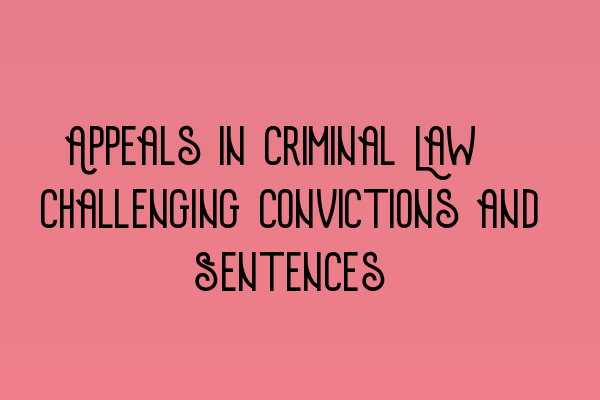Appeals in Criminal Law: Challenging Convictions and Sentences
Welcome to SQE Criminal Law & Practice Law UK blog! In this post, we will dive into the intricacies of appeals in criminal law, specifically focusing on challenging convictions and sentences. If you are preparing for the SQE 1 Practice Exam Questions or SQE 1 Practice Mocks FLK1 FLK2, it is vital to have a comprehensive understanding of the appeals process. Additionally, if you are planning to take the SQE 2 Preparation Courses or SQE 1 Preparation Courses, this knowledge will be invaluable in your future legal practice.
Understanding the Appeals Process
When a defendant is convicted of a criminal offense, they have the right to appeal the conviction or the sentence imposed by the court. Appeals play a vital role in the criminal justice system, providing an avenue for challenging and rectifying potential errors made during the trial. However, it is essential to note that appeals are not automatic, and specific criteria must be met for an appeal to be considered.
In order to appeal a conviction or sentence, the defendant must demonstrate that there are grounds for appeal. These grounds can include errors in law, procedural irregularities, or new evidence that was not available during the trial. It is crucial to consult with an experienced appeal lawyer to assess the viability of your case and ensure that all necessary documentation is prepared in a timely manner.
Challenging Convictions
Conviction appeals focus on identifying errors in the legal process or evidence that may have affected the outcome of the trial. Some common grounds for challenging convictions include:
- Legal errors: If it can be proven that the judge made a mistake in interpreting or applying the law, it may serve as grounds for appeal. This can include incorrect jury instructions, misapplication of legal principles, or failure to admit or exclude crucial evidence.
- Procedural irregularities: Any significant deviations or failures to follow proper legal procedures during the trial can be argued as grounds for appeal. This can include issues related to the admission of evidence, improper conduct by the prosecution or defense, or violations of the defendant’s rights.
- New evidence: If new evidence emerges that could substantially impact the case, it may be possible to appeal the conviction. However, there are strict criteria for introducing new evidence, and it must meet the standards set by the court.
If you are planning to challenge a conviction, it is crucial to gather all relevant evidence and consult with an experienced appeal lawyer who can provide guidance and support throughout the process.
Challenging Sentences
In addition to challenging convictions, defendants also have the right to appeal the sentences imposed by the court. Sentencing appeals focus on demonstrating that the sentence was excessive, inappropriate, or not in accordance with the applicable law. Some grounds for challenging sentences include:
- Mitigating circumstances: If there were significant factors or circumstances that were not adequately considered during sentencing, it may be possible to appeal the sentence. This can include factors such as the defendant’s background, mental health issues, or evidence of rehabilitation.
- Legal errors: Similar to conviction appeals, if the judge made a mistake in applying the appropriate sentencing guidelines or principles, it can be argued as grounds for appeal.
- Disproportionate sentence: If the sentence imposed by the court is significantly harsher than what is typically given for similar offenses, it may be possible to appeal on the grounds of disproportionality. However, it is essential to note that the court has discretion in determining appropriate sentences, and the appeal process can be complex.
An experienced appeal lawyer can thoroughly assess your case and advise you on the potential grounds for challenging the sentence. They will work diligently to gather supporting evidence and construct strong legal arguments to present your case effectively.
Remember, the appeals process can be intricate, and it is crucial to seek professional guidance to navigate through it successfully. At SQE Criminal Law & Practice Law UK, we offer comprehensive SQE 2 Preparation Courses and SQE 1 Preparation Courses to equip aspiring solicitors with the knowledge and skills required to excel in their legal careers. Stay updated with the latest SRA SQE Exam Dates to plan your preparation effectively.
We hope you found this blog post informative and insightful. If you have any further questions or require legal assistance, feel free to contact us at SQE Criminal Law & Practice Law UK.
